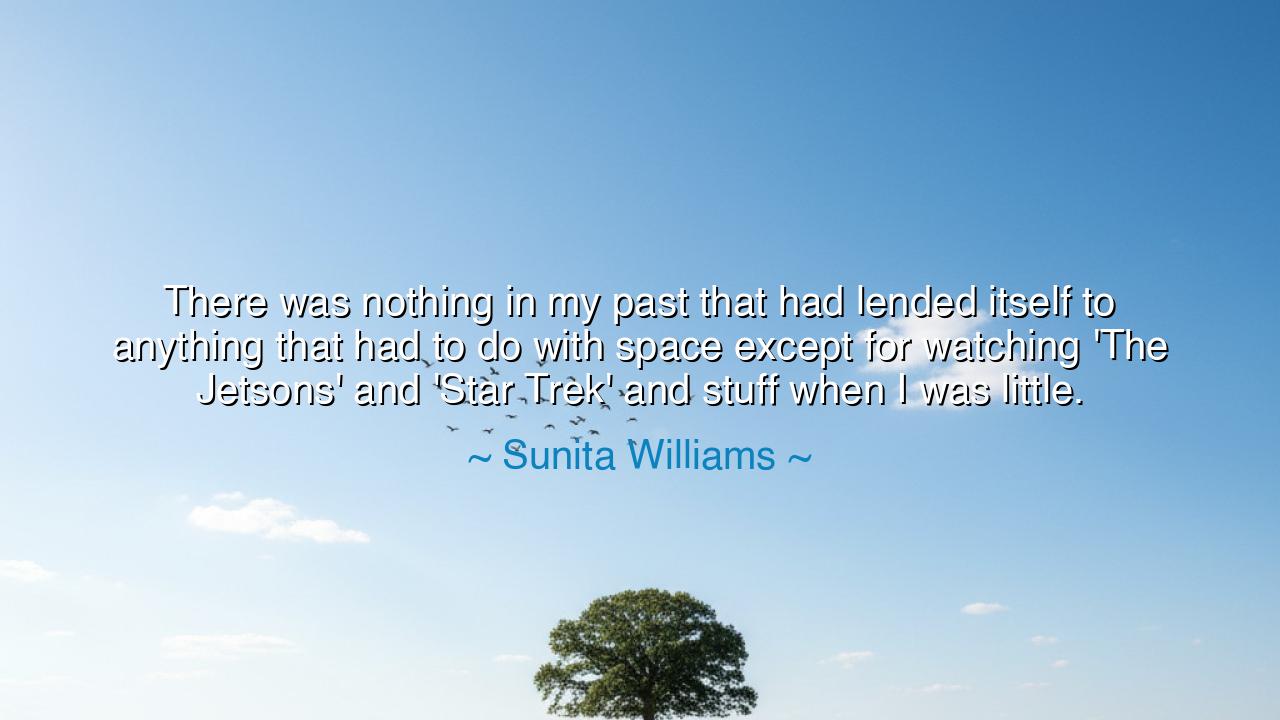
There was nothing in my past that had lended itself to anything
There was nothing in my past that had lended itself to anything that had to do with space except for watching 'The Jetsons' and 'Star Trek' and stuff when I was little.






Hear the words of Sunita Williams, voyager among the stars and child of Earth, who confessed with humility and wonder: “There was nothing in my past that had lended itself to anything that had to do with space except for watching The Jetsons and Star Trek and stuff when I was little.” These words are not the denial of destiny, but the celebration of it. For Williams reminds us that greatness does not always arise from a carefully plotted path, but often from the mysterious union of childhood dreams and adult perseverance.
For what is destiny but a thread woven from unlikely beginnings? Williams, who spent months aboard the International Space Station, did not grow up surrounded by rockets, engineers, or astronomers. Her past bore no clear sign that she would one day float above the Earth, gazing down upon continents and seas. Yet her imagination was stirred by simple things—stories, visions of the future seen on a glowing screen. From The Jetsons with their playful skies, from Star Trek with its daring voyages, came seeds planted in the soil of her young mind. These seeds, watered by time and effort, grew into the tree of her calling.
History itself abounds with such stories. Consider Abraham Lincoln, born in a log cabin with little education, who read books by firelight and dreamed of a broader world. Nothing in his humble past suggested he would one day guide a fractured nation through its darkest hour. Yet his dreams and his persistence carried him from obscurity to greatness. So it was with Williams: though her childhood was not filled with laboratories and rockets, her dreams were strong enough to chart her course to the stars.
Her words also teach us that inspiration need not come from grand beginnings. A child may be stirred by a story, a film, a comic, a single spark of imagination. These simple beginnings are not lesser because they seem ordinary; they are holy, for within them lies the power to awaken the human spirit. Williams did not despise her playful inspirations—she cherished them, and from them drew the courage to pursue her path. What matters is not where one begins, but whether one dares to continue.
And yet, Williams speaks with humility, reminding us that even heroes of space are ordinary souls at their core. They were once children watching cartoons, once dreamers gazing at screens, once people with no evidence that they would be chosen for greatness. This humility is itself a teaching: if the astronaut, who has touched the stars, began with nothing but simple dreams, then none of us are disqualified from greatness by our beginnings.
The lesson, O seeker, is clear: do not despise your past, however ordinary it may seem. Do not believe that your beginnings must dictate your end. Cherish the small inspirations of your childhood, for they may be the compass of your future. Hold fast to your dreams, even if they seem foolish in the eyes of others, for the foolish dream of today may become the noble achievement of tomorrow.
So in your life, when you look back and see no clear path, remember Williams. Remember that a little girl who watched Star Trek now carries the memory of Earth as a jewel in the dark. Let her story remind you that greatness is not inherited, but chosen, not predestined, but pursued. Whatever your dream, begin where you are, and let your persistence carry you forward. For the stars do not ask who you were—they ask only if you are willing to reach for them.
Thus let Sunita Williams’ words echo as a beacon: your beginnings do not limit your destiny. From the humblest roots may rise the tallest trees, and from the simplest childhood dream may rise a voyager who walks among the stars.






AAdministratorAdministrator
Welcome, honored guests. Please leave a comment, we will respond soon